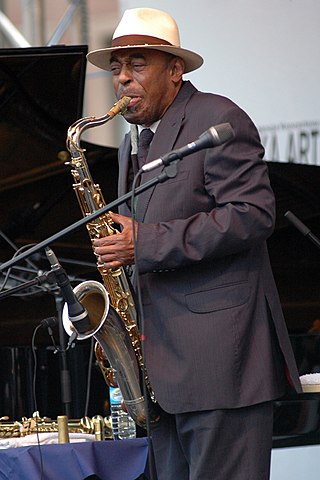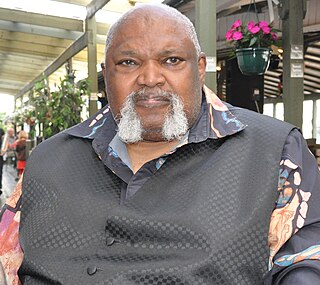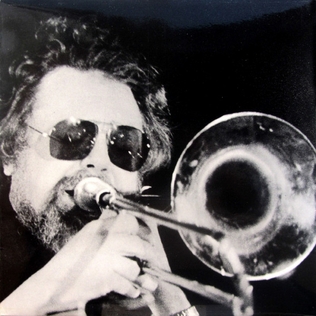Related Research Articles

Archie Shepp is an American jazz saxophonist, educator and playwright who since the 1960s has played a central part in the development of avant-garde jazz.

Theodore Curson was an American jazz trumpeter.

Barry Altschul is a free jazz and hard bop drummer who first came to notice in the late 1960s for performing with pianists Paul Bley and Chick Corea.

Herman Davis "Dave" Burrell is an American jazz pianist. He has played with many jazz musicians including Archie Shepp, Pharoah Sanders, Marion Brown and David Murray.
William Godvin "Beaver" Harris was an American jazz drummer who worked extensively with Archie Shepp.

Marion Brown was an American jazz alto saxophonist, composer, writer, visual artist, and ethnomusicologist. He was a member of the avant-garde jazz scene in New York City during the 1960s, playing alongside musicians such as John Coltrane, Archie Shepp, and John Tchicai. He performed on Coltrane's landmark 1965 album Ascension. AllMusic reviewer Scott Yanow described him as "one of the brightest and most lyrical voices of the 1960s avant-garde."
The New York Art Quartet was a free jazz ensemble, originally made up of saxophonist John Tchicai, trombonist Roswell Rudd, drummer Milford Graves and bassist Lewis Worrell, that came into existence in 1964 in New York City. Worrell was later replaced by various other bassists, including Reggie Workman, Finn Von Eyben, Harold Dodson, Eddie Gómez, Steve Swallow, and Buell Neidlinger. All About Jazz reviewer Clifford Allen wrote that the group "cut some of the most powerful music in the free jazz underground".

Cameron Langdon Brown is an American jazz double bassist known for his association with the Don Pullen/George Adams Quartet.
Walter Howard "Hod" O'Brien was an American jazz pianist.
Norris Jones, better known as Sirone was an American jazz bassist, trombonist, and composer.
The New York Contemporary Five was an avant-garde jazz ensemble active from the summer of 1963 to the spring of 1964. It has been described as "a particularly noteworthy group during its year of existence -- a pioneering avant-garde combo" and "a group which, despite its... short lease on life, has considerable historical significance." Author Bill Shoemaker wrote that the NYCF was "one of the more consequential ensembles of the early 1960s." John Garratt described them as "a meteor that streaked by too fast."

Into the Hot is an album released under the auspices of Gil Evans featuring a large ensemble under the direction of John Carisi and the Cecil Taylor Unit. The album was released on the Impulse! label in 1962.

Mixed is a compilation album of two avant-garde jazz sessions featuring performances by the Cecil Taylor Unit and the Roswell Rudd Sextet. The album was released on the Impulse! label in 1998 and collects three performances by Taylor with Archie Shepp, Jimmy Lyons, Henry Grimes and Sunny Murray with Ted Curson and Roswell Rudd added on one track which were originally released under Gil Evans' name on Into the Hot (1961). The remaining tracks feature Rudd with Giuseppi Logan, Lewis Worrell, Charlie Haden, Beaver Harris and Robin Kenyatta and were originally released as Everywhere (1966). Essentially these are the three Cecil Taylor tracks from the "Gil Evans album" teamed with Roswell Rudd's Impulse album Everywhere, in its entirety.

Montreux Two is a live album by jazz saxophonist Archie Shepp recorded at the Montreux Jazz Festival in 1975 and released on the Arista Freedom label.

In the 1970s jazz, jazz became increasingly influenced by Latin jazz, combining rhythms from African and Latin American countries, often played on instruments such as conga, timbale, güiro, and claves, with jazz and classical harmonies played on typical jazz instruments. Artists such as Chick Corea, John McLaughlin and Al Di Meola increasingly influenced the genre with jazz fusion, a hybrid form of jazz-rock fusion which was developed by combining jazz improvisation with rock rhythms, electric instruments, and the highly amplified stage sound of rock musicians such as Jimi Hendrix. All Music Guide states that "..until around 1967, the worlds of jazz and rock were nearly completely separate." However, "...as rock became more creative and its musicianship improved, and as some in the jazz world became bored with hard bop and did not want to play strictly avant-garde music, the two different idioms began to trade ideas and occasionally combine forces." On June 16, 1972, the New York Jazz Museum opened in New York City at 125 West 55th Street in a one and one-half story building. It became the most important institution for jazz in the world with a 25,000 item archive, free concerts, exhibits, film programs, etc.
In the late 1960s, Latin jazz, combining rhythms from African and Latin American countries, often played on instruments such as conga, timbale, güiro, and claves, with jazz and classical harmonies played on typical jazz instruments broke through. There are two main varieties: Afro-Cuban jazz was played in the US right after the bebop period, while Brazilian jazz became more popular in the 1960s. Afro-Cuban jazz began as a movement in the mid-1950s as bebop musicians such as Dizzy Gillespie and Billy Taylor started Afro-Cuban bands influenced by such Cuban and Puerto Rican musicians as Xavier Cugat, Tito Puente, and Arturo Sandoval. Brazilian jazz such as bossa nova is derived from samba, with influences from jazz and other 20th-century classical and popular music styles. Bossa is generally moderately paced, with melodies sung in Portuguese or English. The style was pioneered by Brazilians João Gilberto and Antônio Carlos Jobim. The related term jazz-samba describes an adaptation of bossa nova compositions to the jazz idiom by American performers such as Stan Getz and Charlie Byrd.

Allen Blairman was an American jazz drummer best known for his performing and recording with Albert Ayler and Mal Waldron.
Marge Records, or Futura Marge, was a jazz record label created in France in 1973 by Gérard Terronès as a continuation of Futura Records. The label changed its name to Futura Marge in 2018.

The Definitive Roswell Rudd is a solo album by Roswell Rudd. It was recorded in Rome, Italy, in March 1979, and was released later that year by the Italian label Horo Records. On the album, which was produced by Horo founder Aldo Sinesio, Rudd is heard on trombone, piano, bass, drums, and voice, using overdubbing.

Four Days in December was a four-day festival of new jazz music that took place at Judson Hall in New York City. Sponsored by the Jazz Composers Guild, it occurred from December 28–31, 1964, and was the group's most visible event. Along with the October Revolution in Jazz, held two months prior and organized by Bill Dixon, it led to a sense of optimism regarding the possibility of producing concerts via non-traditional means.
References
- ↑ Billboard. Nielsen Business Media, Inc. 21 November 1970. p. 84. ISSN 0006-2510.
- ↑ Kennedy, Gary (2002). Barry Kernfeld (ed.). The New Grove Dictionary of Jazz, vol. 1 (2nd ed.). New York: Grove's Dictionaries Inc. p. 848. ISBN 1561592846.
- ↑ Billboard. Nielsen Business Media, Inc. 11 January 1975. p. 3. ISSN 0006-2510.
- ↑ "Charles Tolliver Leader Entry". Jazzdiscography.com. Retrieved 9 June 2021.